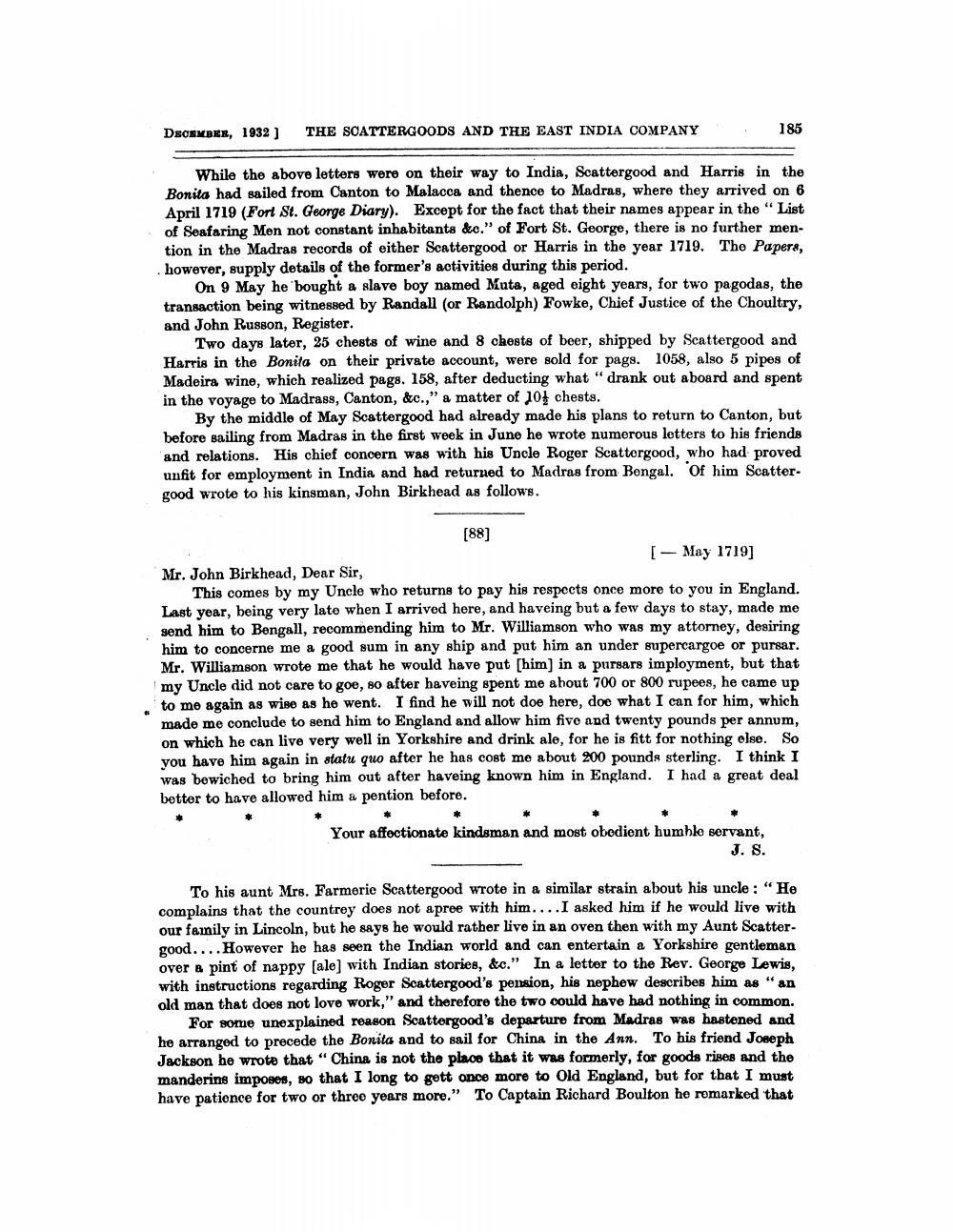________________
DECEMBER, 1932)
THE SCATTERGOODS AND THE EAST INDIA COMPANY.
185
While the above letters were on their way to India, Scattergood and Harris in the Bonita had sailed from Canton to Malacca and thence to Madras, where they arrived on 6 April 1719 (Fort St. George Diary). Except for the fact that their names appear in the "List of Seafaring Men not constant inhabitants &c." of Fort St. George, there is no further mention in the Madras records of either Scattergood or Harris in the year 1719. The Papers, however, supply details of the former's activities during this period.
On 9 May he bought a slave boy named Muta, aged eight years, for two pagodas, the transaction being witnessed by Randall (or Randolph) Fowke, Chief Justice of the Choultry, and John Russon, Register.
Two days later, 25 chests of wine and 8 chests of beer, shipped by Scattergood and Harris in the Bonita on their private account, were sold for pags. 1058, also 5 pipes of Madeira wine, which realized pags. 158, after deducting what "drank out aboard and spent in the voyage to Madrass, Canton, &c.," a matter of 104 chests.
By the middle of May Scattergood had already made his plans to return to Canton, but before sailing from Madras in the first week in June he wrote numerous letters to his friends and relations. His chief concern was with his Uncle Roger Scattergood, who had proved unfit for employment in India and had returned to Madras from Bengal. Of him Scatter. good wrote to his kinsman, John Birkhead as follows.
[88]
[ May 1719] Mr. John Birkhead, Dear Sir,
This comes by my Uncle who returns to pay his respects once more to you in England. Last year, being very late when I arrived here, and haveing but a few days to stay, made me send him to Bengall, recommending him to Mr. Williamson who was my attorney, desiring him to concerne me a good sum in any ship and put him an under supercargoe or pursar. Mr. Williamson wrote me that he would have put [him) in a pursars imployment, but that my Uncle did not care to goe, so after haveing spent me about 700 or 800 rupees, he came up to me again as wise as he went. I find he will not doe here, doe what I can for him, which made me conclude to send him to England and allow him five and twenty pounds per annum, on which he can live very well in Yorkshire and drink ale, for he is fitt for nothing else. So you have him again in statu quo after he has cost me about 200 pounds sterling. I think I was bewiched to bring him out after haveing known him in England. I had a great deal better to have allowed him a pention before.
Your affectionate kindaman and most obodient humble servant,
J. S.
To his aunt Mrs. Farmerie Scattergood wrote in a similar strain about his uncle: "He complains that the countrey does not apree with him....I asked him if he would live with our family in Lincoln, but he says he would rather live in an oven then with my Aunt Scattergood.... However he has seen the Indian world and can entertain a Yorkshire gentleman over a pint of nappy (ale) with Indian stories, &c." In a letter to the Rev. George Lewis, with instructions regarding Roger Scattergood's pension, his nephew describes him as "an old man that does not love work," and therefore the two could have had nothing in common.
For some unexplained reason Scattergood's departure from Madras was bastened and he arranged to precede the Bonita and to sail for China in the Ann. To his friend Joseph Jackson he wrote that "China is not the place that it was formerly, for goods rises and the manderins imposes, so that I long to gett once more to Old England, but for that I must have patience for two or three years more." To Captain Richard Boulton he romarked that




